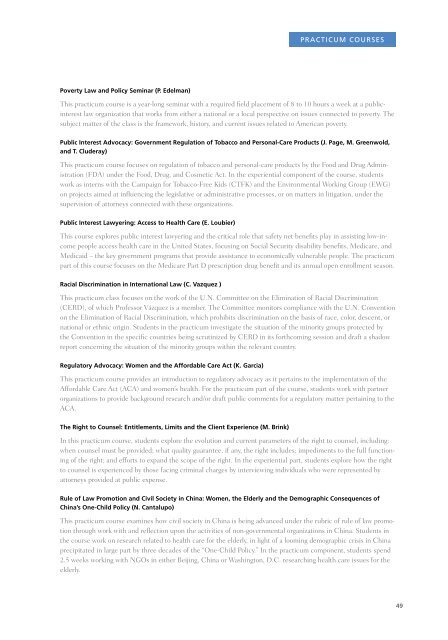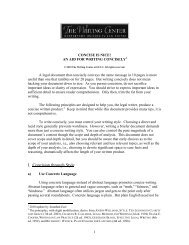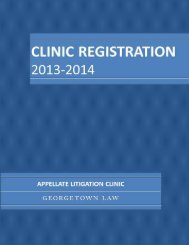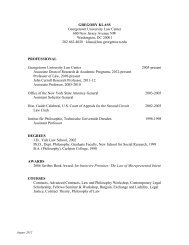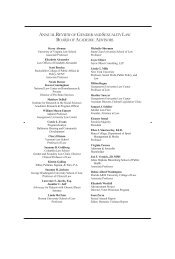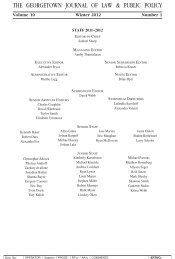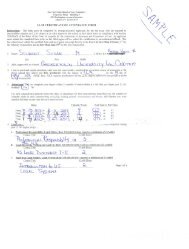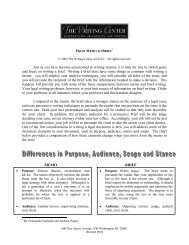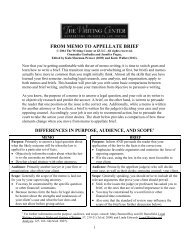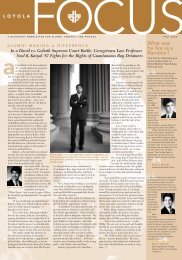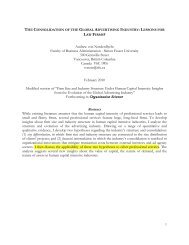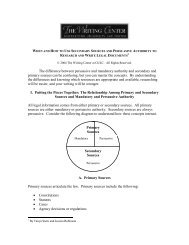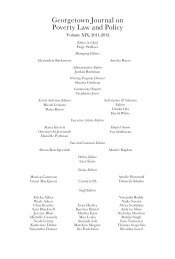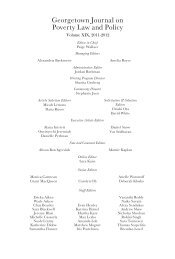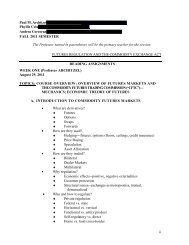experiential learning - Georgetown Law - Georgetown University
experiential learning - Georgetown Law - Georgetown University
experiential learning - Georgetown Law - Georgetown University
You also want an ePaper? Increase the reach of your titles
YUMPU automatically turns print PDFs into web optimized ePapers that Google loves.
Poverty <strong>Law</strong> and Policy Seminar (P. Edelman)<br />
This practicum course is a year-long seminar with a required field placement of 8 to 10 hours a week at a publicinterest<br />
law organization that works from either a national or a local perspective on issues connected to poverty. The<br />
subject matter of the class is the framework, history, and current issues related to American poverty.<br />
Public Interest Advocacy: Government Regulation of Tobacco and Personal-Care Products (J. Page, M. Greenwold,<br />
and T. Cluderay)<br />
This practicum course focuses on regulation of tobacco and personal-care products by the Food and Drug Administration<br />
(FDA) under the Food, Drug, and Cosmetic Act. In the <strong>experiential</strong> component of the course, students<br />
work as interns with the Campaign for Tobacco-Free Kids (CTFK) and the Environmental Working Group (EWG)<br />
on projects aimed at influencing the legislative or administrative processes, or on matters in litigation, under the<br />
supervision of attorneys connected with these organizations.<br />
Public Interest <strong>Law</strong>yering: Access to Health Care (E. Loubier)<br />
This course explores public interest lawyering and the critical role that safety net benefits play in assisting low-income<br />
people access health care in the United States, focusing on Social Security disability benefits, Medicare, and<br />
Medicaid – the key government programs that provide assistance to economically vulnerable people. The practicum<br />
part of this course focuses on the Medicare Part D prescription drug benefit and its annual open enrollment season.<br />
Racial Discrimination in International <strong>Law</strong> (C. Vazquez )<br />
This practicum class focuses on the work of the U.N. Committee on the Elimination of Racial Discrimination<br />
(CERD), of which Professor Vázquez is a member. The Committee monitors compliance with the U.N. Convention<br />
on the Elimination of Racial Discrimination, which prohibits discrimination on the basis of race, color, descent, or<br />
national or ethnic origin. Students in the practicum investigate the situation of the minority groups protected by<br />
the Convention in the specific countries being scrutinized by CERD in its forthcoming session and draft a shadow<br />
report concerning the situation of the minority groups within the relevant country.<br />
Regulatory Advocacy: Women and the Affordable Care Act (K. Garcia)<br />
This practicum course provides an introduction to regulatory advocacy as it pertains to the implementation of the<br />
Affordable Care Act (ACA) and women’s health. For the practicum part of the course, students work with partner<br />
organizations to provide background research and/or draft public comments for a regulatory matter pertaining to the<br />
ACA.<br />
The Right to Counsel: Entitlements, Limits and the Client Experience (M. Brink)<br />
praCtiCum CoursEs<br />
In this practicum course, students explore the evolution and current parameters of the right to counsel, including:<br />
when counsel must be provided; what quality guarantee, if any, the right includes; impediments to the full functioning<br />
of the right; and efforts to expand the scope of the right. In the <strong>experiential</strong> part, students explore how the right<br />
to counsel is experienced by those facing criminal charges by interviewing individuals who were represented by<br />
attorneys provided at public expense.<br />
Rule of <strong>Law</strong> Promotion and Civil Society in China: Women, the Elderly and the Demographic Consequences of<br />
China’s One-Child Policy (N. Cantalupo)<br />
This practicum course examines how civil society in China is being advanced under the rubric of rule of law promotion<br />
through work with and reflection upon the activities of non-governmental organizations in China. Students in<br />
the course work on research related to health care for the elderly, in light of a looming demographic crisis in China<br />
precipitated in large part by three decades of the “One-Child Policy.” In the practicum component, students spend<br />
2.5 weeks working with NGOs in either Beijing, China or Washington, D.C. researching health care issues for the<br />
elderly.<br />
49


